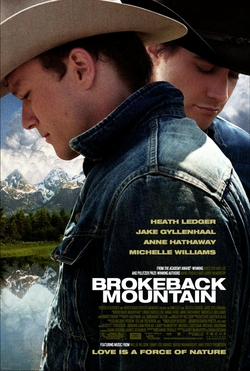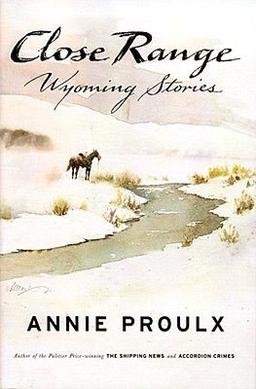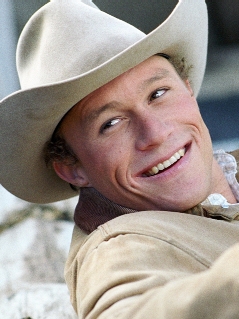
Larry Jeff McMurtry was an American novelist, essayist, prominent book collector, bookseller and screenwriter whose work was predominantly set in either the Old West or contemporary Texas. His novels included Horseman, Pass By (1962), The Last Picture Show (1966), and Terms of Endearment (1975), which were adapted into films. Films adapted from McMurtry's works earned 34 Oscar nominations.

Edna Ann Proulx is an American novelist, short story writer, and journalist. She has written most frequently as Annie Proulx but has also used the names E. Annie Proulx and E.A. Proulx.

Brokeback Mountain is a 2005 American neo-Western romantic drama film directed by Ang Lee and produced by Diana Ossana and James Schamus. Adapted from the 1997 short story of the same name by Annie Proulx, the screenplay was written by Ossana and Larry McMurtry. The film stars Heath Ledger, Jake Gyllenhaal, Anne Hathaway, and Michelle Williams and depicts the complex romantic relationship between two American cowboys, Ennis Del Mar and Jack Twist, in the American West from 1963 to 1983.

Close Range: Wyoming Stories is a 1999 collection of short stories by Annie Proulx, beginning in 1997. The stories are set in the desolate landscape of rural Wyoming and detail the often grim lives of the protagonists.
Diana Lynn Ossana is an American writer who has collaborated on writing screenplays, teleplays, and novels with author Larry McMurtry since they first worked together in 1992, on the semi-fictionalized biography Pretty Boy Floyd. She won an Academy Award for Best Adapted Screenplay, a Writers' Guild of America Award, a BAFTA Award and a Golden Globe Award for her screenplay of Ang Lee's Brokeback Mountain, along with McMurtry and adapted from the short story of the same name by Annie Proulx. She is a published author in her own right of several short stories and essays.
The 71st New York Film Critics Circle Awards, honoring the best in film for 2005, were announced on 12 December 2005 and presented on 8 January 2006.

Brokeback Mountain: Original Motion Picture Soundtrack refers to either or both the two-hour musical soundtrack edited into the 2005 film, Brokeback Mountain, and the recorded albums of music selected from the film. Some tracks have different performers substituted for those heard in the film. The entire chronological list of compositions in the two-hour soundtrack is annotated with notes about the film scenes.
The 10th Florida Film Critics Circle Awards, given by the Florida Film Critics Circle on 24 December 2005, honored the best in film for 2005.
The 11th Dallas-Fort Worth Film Critics Association Awards, given by the Dallas-Fort Worth Film Critics Association on December 19, 2005, honored the best in film for 2005. The organization, founded in 1990, includes 33 film critics for print, radio, television, and internet publications based in North Texas.

Ennis Del Mar is the fictional main character of the short story "Brokeback Mountain" by Annie Proulx, the 2005 Academy Award-winning film adaptation of the same name directed by Ang Lee, and a 2023 play by Ashley Robinson also adapted from the short story. Ennis's story is depicted by his complex sexual and romantic relationship with Jack Twist in the American West, over two decades from 1963 to 1983. In the film, he is portrayed by Heath Ledger, who won the New York Film Critics Circle Award for Best Actor and the Best International Actor Award from the Australian Film Institute and was nominated for the Academy Award for Best Actor, BAFTA Award for Best Actor, Screen Actors Guild Award for Best Actor and Golden Globe Award for Best Actor – Motion Picture Drama for his performance. In the play, he is portrayed by Lucas Hedges.

Jack Twist is a fictional character in the short novel "Brokeback Mountain", by Annie Proulx, and the 2005 film adaptation of the same name where he is portrayed by American actor Jake Gyllenhaal. Jack's story primarily follows the complex sexual and romantic relationship he has with Ennis Del Mar in the American West from 1963 to 1983.
The 1st Austin Film Critics Association Awards honored the best in filmmaking for 2005.
The 2nd St. Louis Gateway Film Critics Association Awards were given on January 8, 2006.
The Chicago Film Critics Association Award for Best Screenplay is one of the annual awards given by the Chicago Film Critics Association.
Brokeback Mountain is an opera by American composer Charles Wuorinen, with a libretto in English by Annie Proulx, based on her 1997 short story "Brokeback Mountain". They began work on it in 2008 under a commission by Gerard Mortier of the New York City Opera. He took the project with him to the Teatro Real of Madrid, where the opera was premiered on January 28, 2014.

Bad Dirt: Wyoming Stories 2 is a collection of short stories by Annie Proulx published in 2004. It was not as well received by critics in comparison with Proulx's 1999 Close Range: Wyoming Stories.
Michael David Faist is an American actor. An alumnus of the American Musical and Dramatic Academy, Faist is the recipient of a Grammy and a Daytime Emmy Award, with nominations for a Tony and a British Academy Film Award.
Brokeback Mountain is a 2005 American romantic drama film directed by Ang Lee.

Brokeback Mountain is a 2023 play written by Ashley Robinson. It is an adaptation of an award-winning 1997 short story by Annie Proulx and the 2005 motion picture of the same name by Diana Ossana and Larry McMurtry. The play has music written by Dan Gillespie Sells and direction by Jonathan Butterell. It had its world premiere in London's West End in May 2023.









